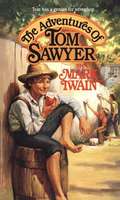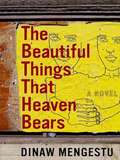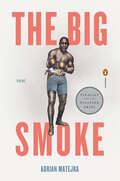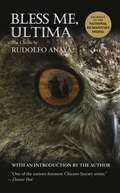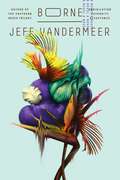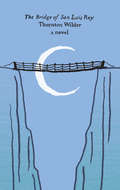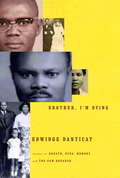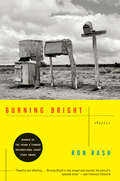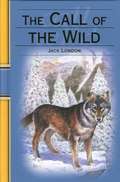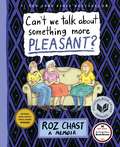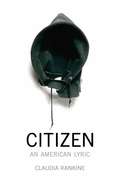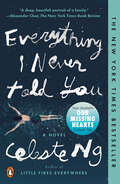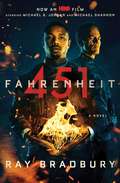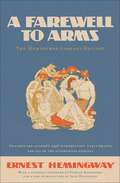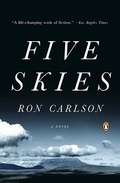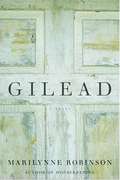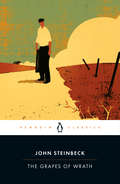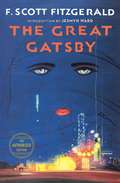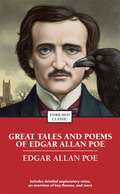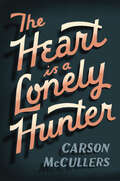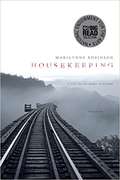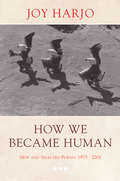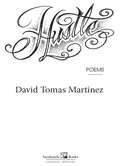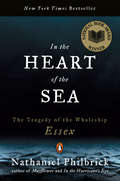Special Collections
Big Read
Description: Spark conversation and provoke thought with this diverse list of acclaimed fiction and non-fiction. The Big Read is a program sponsored by the National Endowment of the Arts aimed at bringing reading back to the heart of American culture. #adults
- Table View
- List View
The Adventures of Tom Sawyer
by Mark TwainMark Twain's classic story of a young boy's life in a small town on the Mississippi River. [This text is listed as an example that meets Common Core Standards in English language arts in grades 6-8 at http://www.corestandards.org.]
The Beautiful Things that Heaven Bears
by Dinaw Mengestu
Seventeen years ago, Sepha Stephanos fled the Ethiopian Revolution for a new start in the United States.
Now he finds himself running a failing grocery store in a poor African-American section of Washington, D. C. , his only companions two fellow African immigrants who share his bitter nostalgia and longing for his home continent.
Years ago and worlds away Sepha could never have imagined a life of such isolation. As his environment begins to change, hope comes in the form of a friendship with new neighbors Judith and Naomi, a white woman and her biracial daughter.
But when a series of racial incidents disturbs the community, Sepha may lose everything all over again.
A literary debut hailed by The New York Times Book Review as a great American novel. Awards Include:
Finalist for the Young Lions Fiction Award
Finalist for the Los Angeles Times Book Prize for First Fiction
Winner of the Guardian First Book Prize
New York Times Notable Book
Winner of the National Book Foundation's "5 Under 35" Award
Recipient of a Lannan Literary Fellowship
Winner of the Prix du Premier Roman
Named the Seattle Reads Selection of 2008
The Big Smoke
by Adrian MatejkaA finalist for both the Pulitzer Prize and the National Book Award in Poetry--a collection that examines the myth and history of the prizefighter Jack Johnson The legendary Jack Johnson (1878-1946) was a true American creation. The child of emancipated slaves, he overcame the violent segregationism of Jim Crow, challenging white boxers--and white America--to become the first African-American heavyweight world champion. The Big Smoke, Adrian Matejka's third work of poetry, follows the fighter's journey from poverty to the most coveted title in sports through the multi-layered voices of Johnson and the white women he brazenly loved. Matejka's book is part historic reclamation and part interrogation of Johnson's complicated legacy, one that often misremembers the magnetic man behind the myth.
Bless Me, Ultima
by Rudolfo AnayaThis coming-of-age classic from "one of the nation's foremost Chicano literary artists" follows a young boy as he questions his faith and beliefs after a curandera woman introduces herbs and magic into his life (Denver Post). Antonio Marez is six years old when Ultima comes to stay with his family in New Mexico. She is a curandera, one who cures with herbs and magic. Under her wise wing, Tony will probe the family ties that bind and rend him, and he will discover himself in the magical secrets of the pagan past--a mythic legacy as palpable as the Catholicism of Latin America. And at each life turn there is Ultima, who delivered Tony into the world... and will nurture the birth of his soul.
Borne
by Jeff VanderMeerNamed one of the most anticipated books of 2017 by The New York Times, The Huffington Post, Book Riot, Chicago Reader, The Week, and Publishers Weekly. “Am I a person?” Borne asked me.“Yes, you are a person,” I told him. “But like a person, you can be a weapon, too.” In Borne, a young woman named Rachel survives as a scavenger in a ruined city half destroyed by drought and conflict. The city is dangerous, littered with discarded experiments from the Company—a biotech firm now derelict—and punished by the unpredictable predations of a giant bear. Rachel ekes out an existence in the shelter of a run-down sanctuary she shares with her partner, Wick, who deals his own homegrown psychoactive biotech. One day, Rachel finds Borne during a scavenging mission and takes him home. Borne as salvage is little more than a green lump—plant or animal?—but exudes a strange charisma. Borne reminds Rachel of the marine life from the island nation of her birth, now lost to rising seas. There is an attachment she resents: in this world any weakness can kill you. Yet, against her instincts—and definitely against Wick’s wishes—Rachel keeps Borne. She cannot help herself. Borne, learning to speak, learning about the world, is fun to be with, and in a world so broken that innocence is a precious thing. For Borne makes Rachel see beauty in the desolation around her. She begins to feel a protectiveness she can ill afford. “He was born, but I had borne him.” But as Borne grows, he begins to threaten the balance of power in the city and to put the security of her sanctuary with Wick at risk. For the Company, it seems, may not be truly dead, and new enemies are creeping in. What Borne will lay bare to Rachel as he changes is how precarious her existence has been, and how dependent on subterfuge and secrets. In the aftermath, nothing may ever be the same.
The Bridge of San Luis Rey
by Thornton Wilder"On Friday noon, July the twentieth, 1714, the finest bridge in all Peru broke and precipitated five travelers into the gulf below." With this celebrated sentence, Thornton Wilder begins The Bridge of San Luis Rey, one of the towering achievements in American fiction and a novel read throughout the world.By chance, a monk witnesses the tragedy. Brother Juniper seeks to prove that it was divine intervention rather than chance that led to the deaths of those who perished in the tragedy. His study leads to his own death -- and to the author's timeless investigation into the nature of love and the meaning of the human condition.The Bridge of San Luis Rey is now reissued in this handsome hardcover edition featuring a new foreword by Russell Banks. Tappan Wilder has written an engaging and thought-provoking afterword, which includes unpublished notes for the Pulitzer Prize-winning novel, illuminating photographs, and other remarkable documentary material. Granville Hicks's insightful comment about Wilder suggests an inveterate truth: "As a craftsman he is second to none, and there are few who have looked deeper into the human heart."
Brother, I'm Dying
by Edwidge DanticatFrom the best-selling author of "The Dew Breaker," a major work of nonfiction: a powerfully moving family story that centers around the men closest to her heart--her father, Mira, and his older brother, Joseph. From the age of four, Edwidge Danticat came to think of her uncle Joseph, a charismatic pastor, as her "second father," when she was placed in his care after her parents left Haiti for a better life in America. Listening to his sermons, sharing coconut-flavored ices on their walks through town, roaming through the house that held together many members of a colorful extended family, Edwidge grew profoundly attached to Joseph. He was the man who "knew all the verses for love. " And so she experiences a jumble of emotions when, at twelve, she joins her parents in New York City. She is at last reunited with her two youngest brothers, and with her mother and father, whom she has struggled to remember. But she must also leave behind Joseph and the only home she's ever known. Edwidge tells of making a new life in a new country while fearing for the safety of those still in Haiti as the political situation deteriorates. But "Brother I'm Dying" soon becomes a terrifying tale of good people caught up in events beyond their control. Late in 2004, his life threatened by an angry mob, forced to flee his church, the frail, eighty-one-year-old Joseph makes his way to Miami, where he thinks he will be safe. Instead, he is detained by U. S. Customs, held by the Department of Homeland Security, brutally imprisoned, and dead within days. It was a story that made headlines around the world. His brother, Mira, will soon join him in death, but not before he holds hope in his arms: Edwidge's firstborn, who will bear his name--and the family's stories, both joyous and tragic--into the next generation. Told with tremendous feeling, this is a true-life epic on an intimate scale: a deeply affecting story of home and family--of two men's lives and deaths, and of a daughter's great love for them both.
Burning Bright
by Ron RashNew York Times bestselling and award-winning author Ron Rash is "a storyteller of the highest rank" (Jeffrey Lent) and has won comparisons to John Steinbeck, Cormac McCarthy, and Gabriel GarcÍa MÁrquez. It is rare that an author can capture the complexities of a place as though it were a person, and rarer still that one can reveal a land as dichotomous and fractious as Appalachia-a muse; a siren; a rugged, brutal landscape of exceptional beauty, promise, and suffering-with the honesty and precision of a photograph. "If you haven't heard of the Southern writer Ron Rash, it is time you should" (The Plain Dealer). In Burning Bright, the stories span the years from the Civil War to the present day, and Rash's historical and modern settings are sewn together in a hauntingly beautiful patchwork of suspense and myth, populated by raw and unforgettable characters mined from the landscape of Appalachia. In "Back of Beyond," a pawnshop owner who profits from the stolen goods of local meth addicts-including his own nephew-comes to the aid of his brother and sister-in-law when they are threatened by their son. The pregnant wife of a Lincoln sympathizer alone in Confederate territory takes revenge to protect her family in "Lincolnites." And in the title story, a woman from a small town marries an outsider; when an unknown arsonist starts fires in the Smoky Mountains, her husband becomes the key suspect. In these stories, Rash brings to light a previously unexplored territory, hidden in plain sight-first a landscape, and then the dark yet lyrical heart and the alluringly melancholy soul of his characters and their home.
The Call of the Wild
by Jack LondonFirst published in 1903, The Call of the Wild is regarded as Jack London's masterpiece. Based on London's experiences as a gold prospector in the Canadian wilderness and his ideas about nature and the struggle for existence, The Call of the Wild is a tale about unbreakable spirit and the fight for survival in the frozen Alaskan Klondike.
Can't We Talk about Something More Pleasant?
by Roz Chast#1 New York Times Bestseller2014 NATIONAL BOOK AWARD FINALISTIn her first memoir, New Yorker cartoonist Roz Chast brings her signature wit to the topic of aging parents. Spanning the last several years of their lives and told through four-color cartoons, family photos, and documents, and a narrative as rife with laughs as it is with tears, Chast's memoir is both comfort and comic relief for anyone experiencing the life-altering loss of elderly parents.When it came to her elderly mother and father, Roz held to the practices of denial, avoidance, and distraction. But when Elizabeth Chast climbed a ladder to locate an old souvenir from the “crazy closet”-with predictable results-the tools that had served Roz well through her parents' seventies, eighties, and into their early nineties could no longer be deployed. While the particulars are Chast-ian in their idiosyncrasies-an anxious father who had relied heavily on his wife for stability as he slipped into dementia and a former assistant principal mother whose overbearing personality had sidelined Roz for decades-the themes are universal: adult children accepting a parental role; aging and unstable parents leaving a family home for an institution; dealing with uncomfortable physical intimacies; managing logistics; and hiring strangers to provide the most personal care. An amazing portrait of two lives at their end and an only child coping as best she can, Can't We Talk about Something More Pleasant will show the full range of Roz Chast's talent as cartoonist and storyteller.
Citizen
by Claudia RankineA provocative meditation on race, Claudia Rankine’s long-awaited follow up to her groundbreaking book Don’t Let Me Be Lonely: An American Lyric
Claudia Rankine’s bold new book recounts mounting racial aggressions in ongoing encounters in twenty-first-century daily life and in the media. Some of these encounters are slights, seeming slips of the tongue, and some are intentional offensives in the classroom, at the supermarket, at home, on the tennis court with Serena Williams and the soccer field with Zinedine Zidane, online, on TV—everywhere, all the time. The accumulative stresses come to bear on a person’s ability to speak, perform, and stay alive. Our addressability is tied to the state of our belonging, Rankine argues, as are our assumptions and expectations of citizenship. In essay, image, and poetry, Citizen is a powerful testament to the individual and collective effects of racism in our contemporary, often named “post-race” society.
Everything I Never Told You
by Celeste NgLydia is the favorite child of Marilyn and James Lee; their middle daughter, a girl who inherited her mother's bright blue eyes and her father's jet-black hair. Her parents are determined that Lydia will fulfill the dreams they were unable to pursue--in Marilyn's case that her daughter become a doctor rather than a homemaker, in James's case that Lydia be popular at school, a girl with a busy social life and the center of every party. When Lydia's body is found in the local lake, the delicate balancing act that has been keeping the Lee family together tumbles into chaos, forcing them to confront the long-kept secrets that have been slowly pulling them apart.
James, consumed by guilt, sets out on a reckless path that may destroy his marriage. Marilyn, devastated and vengeful, is determined to find a responsible party, no matter what the cost. Lydia's older brother, Nathan, is certain that the neighborhood bad boy Jack is somehow involved. But it's the youngest of the family--Hannah--who observes far more than anyone realizes and who may be the only one who knows the truth about what happened.
A profoundly moving story of family, history, and the meaning of home, Everything I Never Told You is both a gripping page-turner and a sensitive family portrait, exploring the divisions between cultures and the rifts within a family, and uncovering the ways in which mothers and daughters, fathers and sons, and husbands and wives struggle, all their lives, to understand one another.
Fahrenheit 451
by Ray BradburyRay Bradbury's internationally acclaimed novel Fahrenheit 451 is a masterwork of 20th century literature set in a bleak, dystopian future.
Guy Montag is a fireman. In his world, where television rules and literature is on the brink of extinction, firemen start fires rather than put them out. His job is to destroy the most illegal of commodities, the printed book, along with the houses in which they are hidden.
Montag never questions the destruction and ruin his actions produce, returning each day to his bland life and wife, Mildred, who spends all day with her television "family." But then he meets an eccentric young neighbor, Clarisse, who introduces him to a past where people didn't live in fear and to a present where one sees the world through the ideas in books instead of the mindless chatter of television.
When Mildred attempts suicide and Clarisse suddenly disappears, Montag begins to question everything he has ever known. He starts hiding books in his home, and when his pilfering is discovered, the fireman has to run for his life.
Hugo Award winner.
A Farewell to Arms
by Ernest Hemingway and Sean Hemingway and Patrick HemingwayWritten when Ernest Hemingway was thirty years old and lauded as the best American novel to emerge from World War I, A Farewell to Arms is the unforgettable story of an American ambulance driver on the Italian front and his passion for a beautiful English nurse. Set against the looming horrors of the battlefield--weary, demoralized men marching in the rain during the German attack on Caporetto; the profound struggle between loyalty and desertion--this gripping, semiautobiographical work captures the harsh realities of war and the pain of lovers caught in its inexorable sweep. Ernest Hemingway famously said that he rewrote the ending to A Farewell to Arms thirty-nine times to get the words right. This edition collects all of the alternative endings together for the first time, along with early drafts of other essential passages, offering new insight into Hemingway's craft and creative process and the evolution of one of the greatest novels of the twentieth century. Featuring Hemingway's own 1948 introduction to an illustrated reissue of the novel, a personal foreword by the author's son Patrick Hemingway, and a new introduction by the author's grandson Seán Hemingway, this edition of A Farewell to Arms is truly a celebration.
Five Skies
by Ron CarlsonBeloved story writer Ron Carlson's first novel in thirty years, Five Skies is the story of three men gathered high in the Rocky Mountains for a construction project that is to last the summer. Having participated in a spectacular betrayal in Los Angeles, the giant, silent Arthur Key drifts into work as a carpenter in southern Idaho. Here he is hired, along with the shiftless and charming Ronnie Panelli, to build a stunt ramp beside a cavernous void. The two will be led by Darwin Gallegos, the foreman of the local ranch who is filled with a primeval rage at God, at man, at life. As they endeavor upon this simple, grand project, the three reveal themselves in cautiously resonant, profound ways. And in a voice of striking intimacy and grace, Carlson's novel reveals itself as a story of biblical, almost spiritual force. A bellwether return from one of our greatest craftsmen, Five Skies is sure to be one of the most praised and cherished novels of the year. .
Gilead
by Marilynne RobinsonIn 1956, toward the end of Reverend John Ames's life, he begins a letter to his young son, an account of himself and his forebears. Ames is the son of an Iowan preacher and the grandson of a minister who, as a young man in Maine, saw a vision of Christ bound in chains and came west to Kansas to fight for abolition: He "preached men into the Civil War," then, at age fifty, became a chaplain in the Union Army, losing his right eye in battle.
Reverend Ames writes to his son about the tension between his father--an ardent pacifist--and his grandfather, whose pistol and bloody shirts, concealed in an army blanket, may be relics from the fight between the abolitionists and those settlers who wanted to vote Kansas into the union as a slave state. And he tells a story of the sacred bonds between fathers and sons, which are tested in his tender and strained relationship with his namesake, John Ames Boughton, his best friend's wayward son.
This is also the tale of another remarkable vision--not a corporeal vision of God but the vision of life as a wondrously strange creation. It tells how wisdom was forged in Ames's soul during his solitary life, and how history lives through generations, pervasively present even when betrayed and forgotten.
Pulitzer Prize Winner
The Grapes of Wrath
by John Steinbeck and Robert DemottThe Pulitzer Prize-winning epic of the Great Depression, a book that galvanized--and sometimes outraged--millions of readers.
First published in 1939, Steinbeck's Pulitzer Prize-winning epic of the Great Depression chronicles the Dust Bowl migration of the 1930s and tells the story of one Oklahoma farm family, the Joads-driven from their homestead and forced to travel west to the promised land of California. Out of their trials and their repeated collisions against the hard realities of an America divided into Haves and Have-Nots evolves a drama that is intensely human yet majestic in its scale and moral vision, elemental yet plainspoken, tragic but ultimately stirring in its human dignity.
A portrait of the conflict between the powerful and the powerless, of one man's fierce reaction to injustice, and of one woman's stoical strength, the novel captures the horrors of the Great Depression and probes into the very nature of equality and justice in America.
The Grapes of Wrath summed up its era in the way that Uncle Tom's Cabin summed up the years of slavery before the Civil War. Sensitive to fascist and communist criticism, Steinbeck insisted that "The Battle Hymn of the Republic" be printed in its entirety in the first edition of the book--which takes its title from the first verse: "He is trampling out the vintage where the grapes of wrath are stored." At once a naturalistic epic, captivity narrative, road novel, and transcendental gospel, Steinbeck's powerful landmark novel is perhaps the most American of American Classics.
This edition contains an introduction and notes by Steinbeck scholar Robert Demott.
The Great Gatsby
by F. Scott FitzgeraldThe only edition of the beloved classic that is authorized by Fitzgerald&’s family and from his lifelong publisher. This edition is the enduring original text, updated with the author&’s own revisions, a foreword by his granddaughter, and with a new introduction by National Book Award winner Jesmyn Ward. The Great Gatsby, F. Scott Fitzgerald&’s third book, stands as the supreme achievement of his career. First published by Scribner in 1925, this quintessential novel of the Jazz Age has been acclaimed by generations of readers. The story of the mysteriously wealthy Jay Gatsby and his love for the beautiful Daisy Buchanan is an exquisitely crafted tale of America in the 1920s.
Great Tales and Poems of Edgar Allan Poe
by Edgar Allan PoeEnduring Literature Illuminated By Practical Scholarship A collection of the Gothic master's classic works in prose and verse. This Enriched Classic Edition Includes: A concise introduction that gives the reader important background information A chronology of the author's life and work A timeline of significant events that provides the book's historical context An outline of key themes and plot points to guide the reader's own interpretations Detailed explanatory notes Critical analysis, including contemporary and modern perspectives on the work Discussion questions to promote lively classroom and book group interaction A list of recommended related books and films to broaden the reader's experience Enriched Classics offer readers affordable editions of great works of literature enhanced by helpful notes and insightful commentary. The scholarship provided in Enriched Classics enables readers to appreciate, understand, and enjoy the world's finest books to their full potential.
The Heart Is A Lonely Hunter
by Carson MccullersWith its profound sense of moral isolation and its compassionate glimpses into its characters' inner lives, the novel is considered McCullers' finest work, an enduring masterpiece first published by Houghton Mifflin in 1940. At its center is the deaf-mute John Singer, who becomes the confidant for various types of misfits in a Georgia mill town during the 1930s. Each one yearns for escape from small town life.
When Singer's mute companion goes insane, Singer moves into the Kelly house, where Mick Kelly, the book's heroine (and loosely based on McCullers), finds solace in her music. Wonderfully attuned to the spiritual isolation that underlies the human condition, and with a deft sense for racial tensions in the South, McCullers spins a haunting, unforgettable story that gives voice to the rejected, the forgotten, and the mistreated -- and, through Mick Kelly, gives voice to the quiet, intensely personal search for beauty.
Housekeeping
by Marilynne RobinsonA modern classic, Housekeeping is the story of Ruth and her younger sister, Lucille, who grow up haphazardly, first under the care of their competent grandmother, then of two comically bumbling great-aunts, and finally of Sylvie, their eccentric and remote aunt.
The family house is in the small Far West town of Fingerbone set on a glacial lake, the same lake where their grandfather died in a spectacular train wreck, and their mother drove off a cliff to her death.
It is a town "chastened by an outsized landscape and extravagant weather, and chastened again by an awareness that the whole of human history had occurred elsewhere."
Ruth and Lucille's struggle toward adulthood beautifully illuminates the price of loss and survival, and the dangerous and deep undertow of transience.
How We Became Human
by Joy HarjoOver a quarter-century's work from the 2003 winner of the Arrell Gibson Award for Lifetime Achievement. This collection gathers poems from throughout Joy Harjo's twenty-eight-year career, beginning in 1973 in the age marked by the takeover at Wounded Knee and the rejuvenation of indigenous cultures in the world through poetry and music. How We Became Human explores its title question in poems of sustaining grace. To view text with line endings as poet intended, please set font size to the smallest size on your device.
Hustle
by David Tomas Martinez"David Martinez is like an algebra problem invented by America-he's polynomial, and fractioned, full of identity variables and unsolved narrative coefficients. . . . Hustle is full of dashing nerve, linguistic flair, and unfakeable heart."-Tony HoaglandThe dark peoples with things:for keys, coins, pencilsand pens our pockets grieve.No street lights or signs,no liquor stores or bars,only a lighter for a flashlight,and the same-faced trees,similar-armed stonesand crooked bushesstaring back at me.There is no path in the woods for a boy from the city.I would have set fire to get off this wildernessbut Palomar is no El Camino in an empty lot,the plastic dripping from the dashand the paint bubbling like a toad's throat.If mountains were old pieces of furniture,I would have lit the fabric and danced.If mountains were abandoned crack houses,I would have opened their meanings with flame,if that would have let the wind and trees lead my eyesor shown me the moon's tiptoe on the moss-as you effect my hand,as we walk into the side of a Sunday night. David Tomas Martinez has published in San Diego Writer's Ink, Charlotte Journal, Poetry International, and has been featured in Border Voices. A PhD candidate at the University of Houston, Martinez is also an editor for Gulf Coast.
In the Heart of the Sea
by Nathaniel Philbrick"With its huge, scarred head halfway out of the water and its tail beating the ocean into a white-water wake more than forty feet across, the whale approached the ship at twice its original speed--at least six knots. With a tremendous cracking and splintering of oak, it struck the ship just beneath the anchor secured at the cat-head on the port bow..."
In the Heart of the Sea brings to new life the incredible story of the wreck of the whaleship Essex--an event as mythic in its own century as the Titanic disaster in ours, and the inspiration for the climax of Moby-Dick. In a harrowing page-turner, Nathaniel Philbrick restores this epic story to its rightful place in American history.
In 1820, the 240-ton Essex set sail from Nantucket on a routine voyage for whales. Fifteen months later, in the farthest reaches of the South Pacific, it was repeatedly rammed and sunk by an eighty-ton bull sperm whale. Its twenty-man crew, fearing cannibals on the islands to the west, made for the 3,000-mile-distant coast of South America in three tiny boats. During ninety days at sea under horrendous conditions, the survivors clung to life as one by one, they succumbed to hunger, thirst, disease, and fear.
In the Heart of the Sea tells perhaps the greatest sea story ever. Philbrick interweaves his account of this extraordinary ordeal of ordinary men with a wealth of whale lore and with a brilliantly detailed portrait of the lost, unique community of Nantucket whalers. Impeccably researched and beautifully told, the book delivers the ultimate portrait of man against nature, drawing on a remarkable range of archival and modern sources, including a long-lost account by the ship's cabin boy. At once a literary companion and a page-turner that speaks to the same issues of class, race, and man's relationship to nature that permeate the works of Melville, In the Heart of the Sea will endure as a vital work of American history.
Winner of the National Book Award
